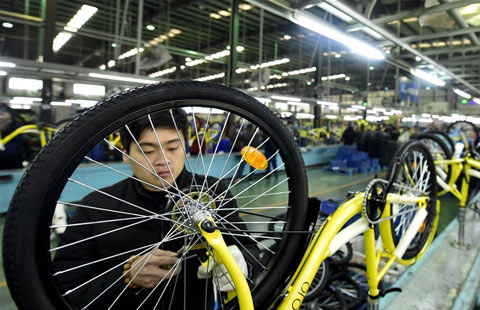Young workers' need for decent physical spaces a global phenomenon
 |
|
Young workers chat with each other in the CBD area in Beijing. PROVIDED TO CHINA DAILY |
Chinese millennials attach stronger importance to workplace environment, which is expected to drive companies to improve their physical space, according to some reports.
Some 81 percent of millennials, mostly born in the 1980s and 1990s, consider that high quality office design and layout could improve their engagement and satisfaction at workplace, shows a report by global real estate advisory firm CBRE China.
The 18- to 37-year-olds, according to CBRE research, also display the strongest demand for office rest areas and food-and-beverage facilities in any market in Asia.
When considering new jobs, 45 percent of Chinese respondents said they consider "the quality of physical working environment" as an important factor, two-percentage points higher than the average number of Asia-Pacific countries.
Qi Shuhan, 21, a resident of Chengdu, Sichuan province, who is now doing her internship at a multinational company, said, she feels as if she is "in heaven" each morning when she finds imported dark chocolate bars, raisins, and bottles of soda water neatly placed in the pantry.
"Snacks, fruits, and beverages are free, and they change everyday," said Qi, a sophomore from the Beijing University of Posts and Telecommunications.
Qi said her peers, too, think working environment is important, though they are unlikely to make job decisions based only on factors like free food and drinks.
Workplace location and commuting time, however, appear to be less important to Chinese millennials, compared with employees in other Asia-Pacific countries.
Chinese millennials work 48 hours a week on average, according to a report by workforce solutions provider Manpower Group.
Analysts said companies could use the physical space as a strategy to engage their employees.
Workplaces can be part of a holistic strategy to increase engagement, as they have impact on not only employees' productivity but their attitudes and beliefs, said Steelcase Inc, CEO, Jim Keane, in the company's global report entitled Engagement and The Global Workplace.
Firms should design the workplace as "an ecosystem of interconnected zones" that serve as destinations where people have choice and control over how they work, the Steelcase report showed.
Chinese employees give their workplaces high scores for quality of life at work, ranking third globally behind Mexico and India, according to the findings.
However, it shows quite a few Chinese employees felt disengaged at workplace, and the number is lower than the global average. Reasons behind their relatively negative work attitudes include lower levels of pride and happiness.























